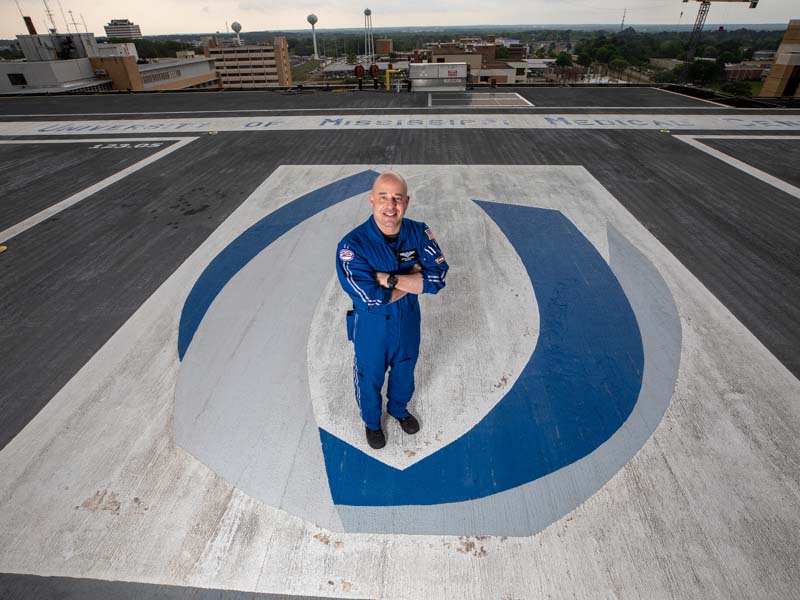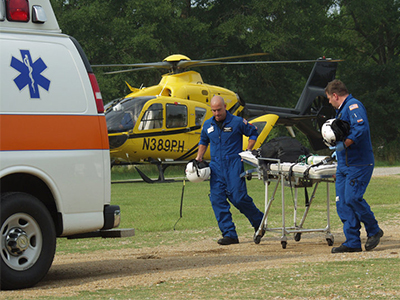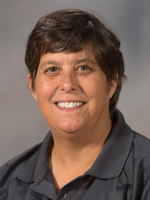#UMMCGrad19: MHS Program bolsters flight nurse’s career opportunities

From the moment he saw a helicopter transport in action, Brock Whitson knew what he wanted to do with his life.
While serving as a part-time emergency room technician during college, Whitson first witnessed the rush and excitement that surrounded the delivery of someone badly in need of treatment into the lifesaving hands of a surgical team.
Almost a decade into his career as a critical care flight nurse at the University of Mississippi Medical Center, Whitson hasn’t lost his zeal for clinical service.
But he is also pragmatic.
“I’m a clinician at heart,” he said. “That’s what I am and will always be. I like the excitement of a hospital.
“But I know I won’t be climbing in and out of a helicopter when I’m 60.”
To prepare for a future that may one day be a little less exciting but no less challenging, Whitson will receive his Master of Health Sciences during the University of Mississippi Medical Center’s 63rd Commencement May 24 in the Mississippi Coliseum.
Although Whitson said he has no immediate plans for a career change, his new degree, earned through the School of Health Related Professions, will help expand his options in the years to come.

“I realized a master’s degree would put me in a better position one day to use my clinical experience and health care administration education,” he said. “When the opportunity presents itself, I would like to be ready.”
Whitson knows all about preparation. Born and raised in New Orleans, he moved to Hattiesburg to attend the University of Southern Mississippi and never left. He knew he wouldn’t be allowed to just jump right into flight transport fresh out of nursing school, so he spent five years gaining emergency room experience and began to obtain extra critical care experience, attend flight physiology classes and work on his flight certification.
When the opportunity to join UMMC’s AirCare team based in Meridian became available, he was more than ready to serve. During his first year of employment, he obtained his Certified Flight Registered Nurse credential. Then his career, pardon the pun, took off.

“Brock joined our UMMC AirCare family 10 years ago and has yet to slow down,” said Whitson’s supervisor Donna Norris, clinical director of Mississippi MED-COM who was a flight nurse on AirCare herself for almost two decades. “He actively seeks opportunities for professional growth and challenges his colleagues to grow in the educational arena.”
Whitson said he began to develop an interest in the business aspect of flight medicine while serving on the AirCare team. He spoke with some colleagues and learned of SHRP’s B.S. in Health Sciences online program.
In between traveling from Hattiesburg to Meridian twice a week to work 24-hour shifts with AirCare, taking continuing education classes and reading medical journals, Brock completed the requirements for his B.S. in health sciences in two years.
But he didn’t stop there. Recognizing the value of a master’s degree, Whitson spent the last two years upping his game with additional online courses, graduate school projects and a capstone defense.
“It’s challenging – it’s by no means going through the motions just to get a degree,” Whitson said. “The instructors really do a good job of pushing you and developing you, but challenging you in a way that forces you to put a lot of time into the studies and presentations, and that allows you to pass.
“Looking back, I’m glad it challenged me. It’s really opened me up to a diverse educational experience and has introduced me to other students I wouldn’t have been exposed to.”
Norris said although educational growth is not a job requirement for the AirCare team, “several team members have taken the step to continue their professional growth and advancement with Brock’s encouragement.” One of those, Brock’s colleague Will Appleby, AirCare critical care paramedic, credits him with influencing flight team members to pursue graduate education.
“Brock is an excellent and professional clinician who has a constant drive to improve himself and those around him,” said Appleby, who earned his B.S. in health sciences along with Brock and is now enrolled in the M.S. in health sciences program. “Our team is constantly educating ourselves and each other in order to be able to provide the best possible care to the Mississippians we serve.
“The B.S. and Master’s programs have helped both of us become more well-rounded clinicians and be able to continue the university’s mission to improve education, research and clinical care. Because of Brock’s experience with the programs, it has also helped influence other members of our team – including myself – to pursue further education in the graduate programs specifically to better understand how we can help with health care in our state.”
Even Whitson’s capstone project – a study of the effects of “compassion fatigue” on the flight care team – promises to impact the program for years to come. Whitson said he was “proud” of the study’s results.
“Our flight team showed high levels of ‘compassion satisfaction’ and low ‘compassion fatigue,’” he said.
The study so intrigued Whitson’s AirCare managers that they indicated an interest in introducing some of its protocols into departmental policy.
“My two worlds – clinical and education – kind of collided in this study, which is kind of neat,” he said. “It would be great to have a little legacy there.”
Throughout his advanced education journey, Whitson said his biggest challenge came at the very beginning.
“Once I decided to take that initial step and enroll, the instructors did a good job of keeping you engaged,” he said. “Once I started it, I knew it was something I would finish. The material was challenging, but I didn’t need a lot of motivation to stay in it.
“To one day transition from the clinical world to maybe the operational world of flight medicine would be nice. All the pieces of this puzzle are coming together, and it will all be worth it in the end.”


